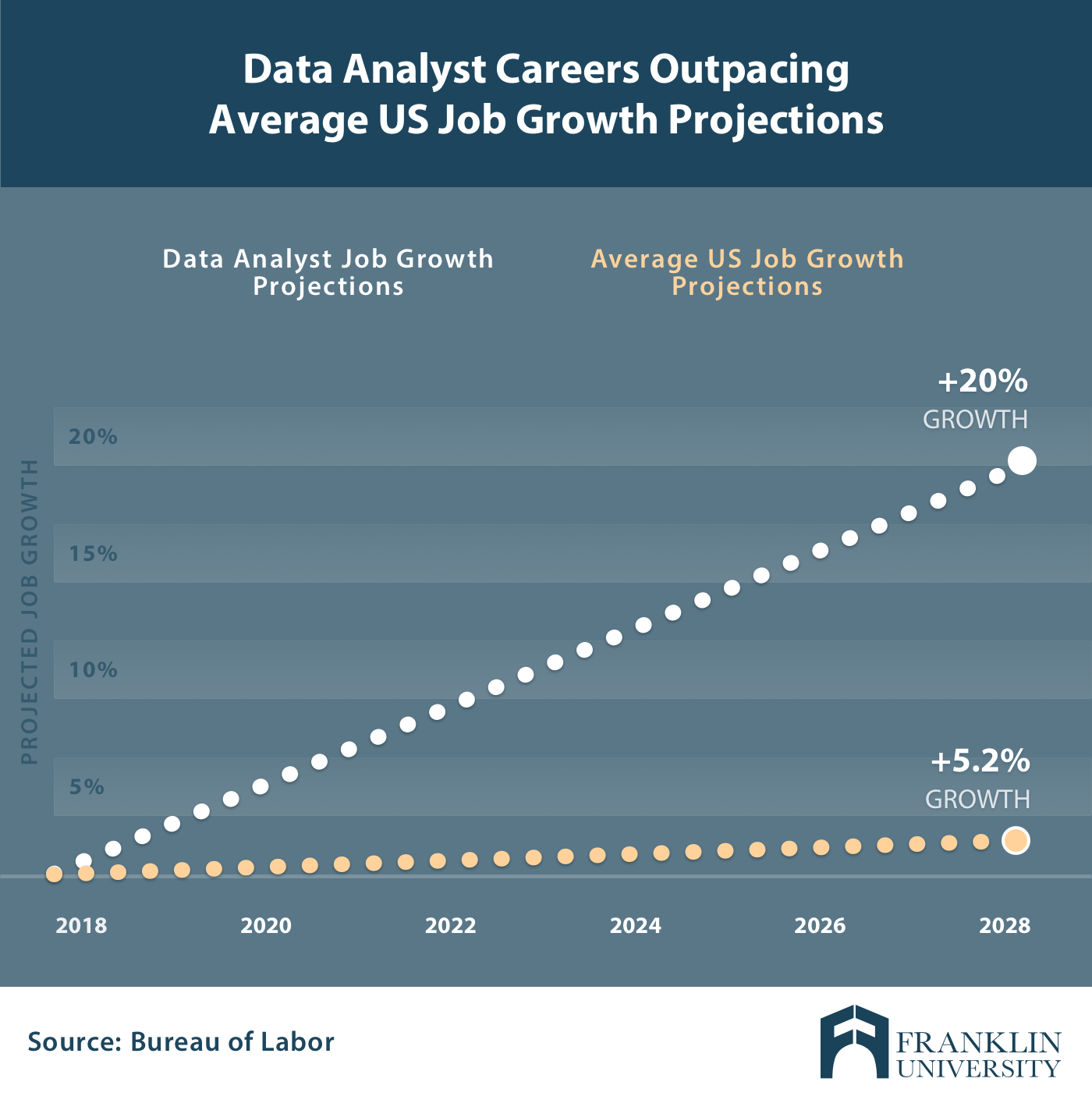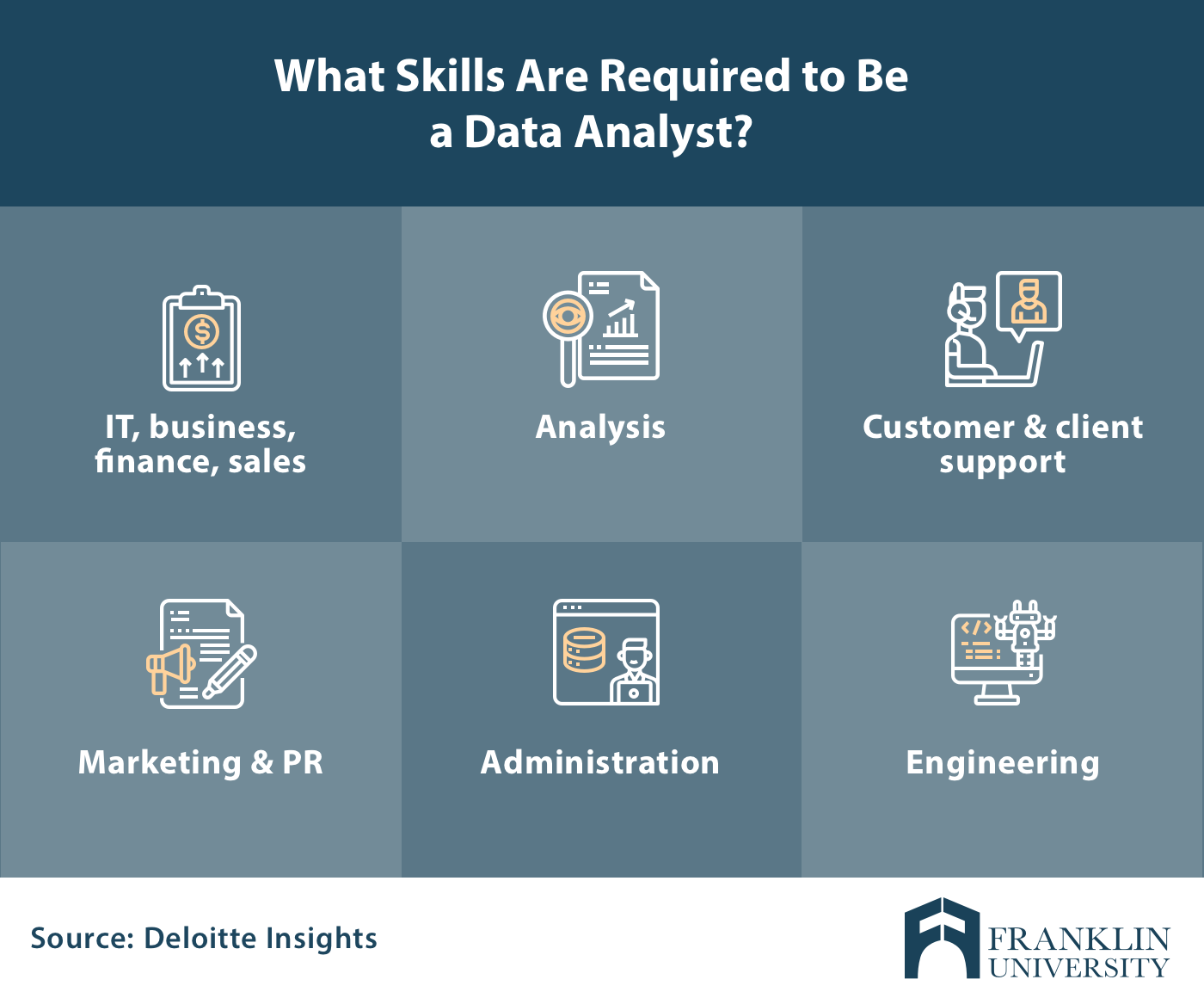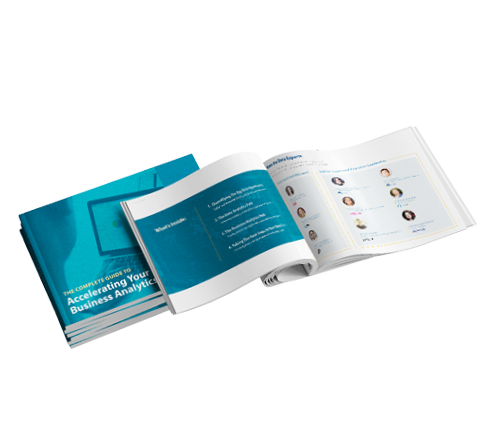Request Information
We're Sorry
There was an unexpected error with the form (your web browser was unable to retrieve some required data from our servers). This kind of error may occur if you have temporarily lost your internet connection. If you're able to verify that your internet connection is stable and the error persists, the Franklin University Help Desk is available to assist you at helpdesk@franklin.edu, 614.947.6682 (local), or 1.866.435.7006 (toll free).
Just a moment while we process your submission.

How to Become a Data Analyst: Education & Skill Requirements
Today’s companies have access to a massive amount of data. Artificial intelligence (AI) and Internet of Things (IoT) technologies are two contributing factors to data growth. However, this data is only useful if it can be transformed into actionable insights.
According to international consulting firm Deloitte, this growing data generation is why the tech industry has increasingly sought employees skilled in analysis. In fact, according to the U.S. Bureau of Labor Statistics, data analyst jobs are projected to see a 20% increase from 2018 to 2028.

Now, more than ever, companies need professionals who can organize and analyze data to make strategic business decisions. With high-paying job opportunities in a variety of thriving industries—including information technology, healthcare, finance, retail, insurance and professional services—there’s never been a better time to pursue a career in data analytics.
Let’s explore the skills and education you need to succeed in this growing field.
What Skills Are Required to Be a Data Analyst?

Data analysts need a unique combination of technical and interpersonal skills to excel. However, finding sought-after professionals with these skills has become difficult.
The tech industry is often at the forefront of the shifting demand for technical skills. This shift could signal a larger movement toward analysis as a core skill across all industries.
However, what does it mean to have analytical skills? Let’s break down the technical skills required to become a data analyst.
Essential Technical Skills for Data Analysts
- Data preparation skills give you the ability to manage large unstructured data sets and turn them into organized and usable data.
- Statistical analysis is core to the work of data analysts and used extensively in predictive analytics. Data analysts are expected to be proficient in foundational statistical methodologies as well as current SAS (a statistical software suite) technologies.
- Applied machine learning acumen is one of the most increasingly sought-after abilities for data analysts. Data analysts can use applied machine learning to automatically detect patterns and trends in the data, expediting the process of harnessing meaningful insights.
- Programming languages, especially R & Python, are essential for creating algorithms that help data analysts manipulate and interpret data.
- Data visualization helps data analysts clearly display data and translate insights for a nontechnical audience. Tableau is one of the prominent data visualization tools used in industry today, making it a core competency for data analysts.
These technical skills are absolutely essential for becoming a data analyst. Interpersonal skills also play a critical role in the success of a data analyst within an organization. In order to be a skilled data analyst, you must also possess these interpersonal skills:
Get a FREE roadmap that includes insider information to help you maximize the many opportunities in the fast-growing field of Big Data.
Essential Interpersonal Skills for Data Analysts
- Critical thinking is essential for data analysts. Diving into the details, while also maintaining a big picture perspective, will make you successful at translating data into actionable insights.
- Creative problem solving is core to the role of a data analyst. You must be able to look at a problem from multiple perspectives and be willing to try different approaches to solve it.
- Communication and presentation skills make data analysts valuable as team members and leaders within an organization. Data analysts must be able to collaborate across departments and help executives turn their findings into effective business strategies.
- Intellectual curiosity helps data analysts constantly explore new methods and technologies to extract meaning from data. A pure desire to learn will help data analysts maintain relevance in this ever-evolving field.
Do I Need a Degree to Become a Data Analyst?
Yes, a bachelor’s degree is the minimum requirement for nearly all data analyst positions.
The field of data analytics has rapidly advanced in the past two decades, resulting in more degree programs dedicated to this specialty. However, data analytics is a relatively new degree in higher education and not all institutions will have dedicated data analytics degrees.
At the bachelor’s level, if an institution doesn’t offer a data analytics major, there are other programs that will prepare you for this career. For example, a bachelor’s degree in computer science, statistics, or information systems can give you the foundational technical skills you need as a data analyst.
As data collection, management and analysis becomes more complex and technology advances, many employers are in search of candidates with master’s degrees. For those looking to excel in this field, pursuing an advanced degree can be one of the best ways to prepare.
What Are The Best Degrees To Stand Out For Data Analyst Jobs?

If you want to compete for top-paying positions at competitive companies, a master’s degree is becoming the gold standard.
According to a 2020 Burtch Works study, 50% or more of data scientists and predictive analytics professionals hold a master’s degree. Many of these professionals hold advanced degrees in statistics, business or engineering. With the rise of dedicated data analytics degrees at the master’s level, you have the opportunity to combine the most beneficial aspects of these areas of study into one specialized degree.
A master’s degree in data analytics will prepare you with advanced skills, including:
- Creating visualizations and interactive dashboards from multiple data sets.
- Applying appropriate data analytics methods to solve real-world business challenges.
- Articulating assumptions, analyses and interpretations of data in a variety of modes.
- Evaluating appropriate ethical use of data.
- Applying best practices in securely managing data.
Top data analytics master’s degree programs will also help you gain industry-recognized credentials that can further set you apart. For example, graduates from Franklin University’s master’s program in data analytics can distinguish themselves as top-notch talent with a SAS Tier 2 Academic Specialization in Data Analytics.
Find The Right Master’s Degree in Data Analytics
If you’re a working professional who is looking to advance or change your career, you need a university tailored to your unique needs.
Franklin University’s flexible, online data analytics program is designed for working adults. The M.S. in Data Analytics at Franklin combines best-practice methodologies with hands-on learning and instruction from industry professionals to get you career-ready in as few as 19 months.
Explore how the M.S. in Data Analytics degree can take your career to the next level and help you advance in the exciting field of data analytics.





